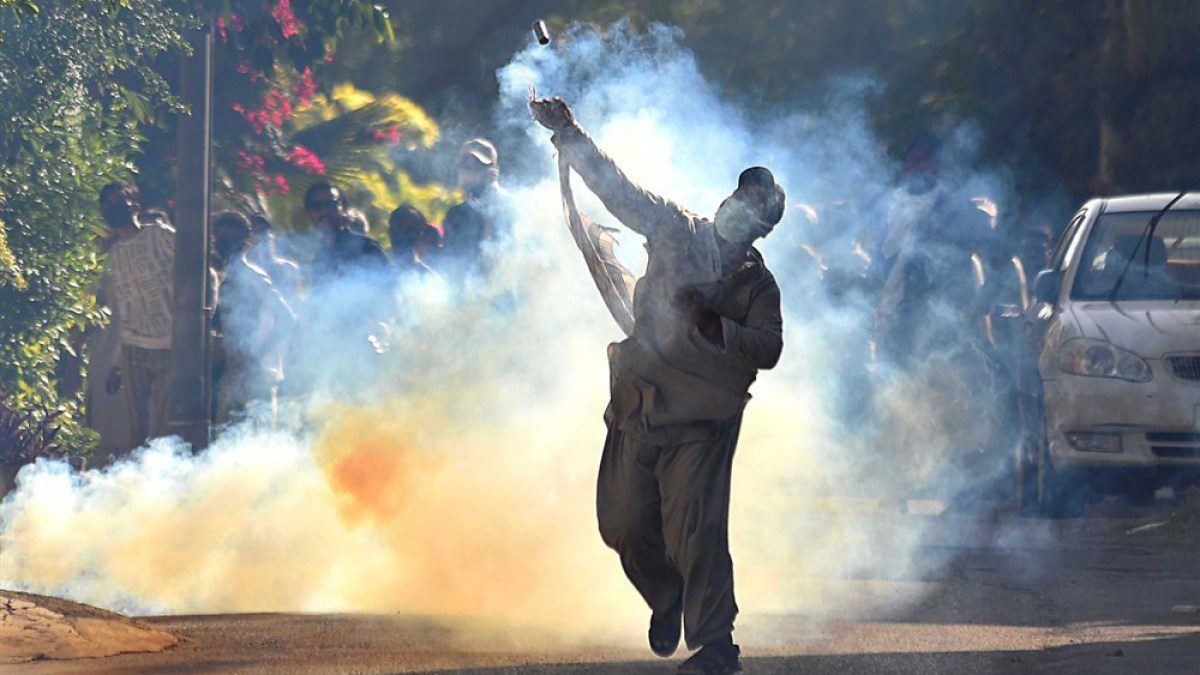Global Courant 2023-05-12 05:19:46
Karachi, Pakistan – On a hot day in Karachi, Mohammad Junaid, an employee of the Pakistan Railways, parks his motorcycle at the side of the road to ask passers-by if they need a ride. Junaid works part-time for a taxi service company and earns about 800 Pakistani rupees ($2.7) a day.
“My salary is not enough to cover the costs,” he told Al Jazeera. “I have to work for Bykea (the ride-hailing startup) to provide for my family.”
However, the suspension of internet services has reduced his income as rides are booked through the app, which needs the internet.
The same is the case with thousands of app-based food delivery companies.
Severe internet connection problems have been reported in the country’s major cities in the past three days after the arrest of Imran Khan, chairman of the Pakistani political party Tehreek-e-Insaf. After the arrest, protests broke out across the country, including in front of the Pakistan Army headquarters. Many cities witnessed violence.
Pakistan’s telecommunications authority said on Tuesday that mobile broadband services had been suspended at the direction of the interior ministry, but did not provide a timetable for its reinstatement. Khan was ordered to be released on Thursday after the country’s highest court declared his arrest illegal. However, the mobile broadband shutdown was not lifted.
The decision came as Pakistan’s economy is struggling on many fronts.
Headline inflation reached a record high of 36.4 percent in April. Employee remittances, which contribute more than 8 percent to the economy, fell 29.2 percent year-on-year in April. Exports fell 26.68 percent year-on-year in April. The World Bank has revised Pakistan’s expected growth from 2 percent to just 0.4 percent.
The political turmoil in the country pushed the Pakistani rupee to a new low of 298.93 against the US dollar in the interbank market on Thursday.
“Pakistan has always struggled with the twin deficits – a current account and a budget deficit,” said Ehsan Malik, the CEO of the Pakistan Business Council, an industry-wide advocacy group. “They have now been overtaken by a third deficit, the confidence deficit. The latest developments are a continuation and build-up of this shortage.”
“The IMF (International Monetary Fund) does not trust the current or the previous government,” said Malik, explaining the lack of confidence. “Our traditionally friendly countries are shy about helping (as Islamabad has not met all the conditions for IMF bailouts). The politicians don’t trust each other. The judiciary is divided and the government is at odds with (the judicial) decisions.”
He said that while demand was severely contracted by inflation, supply was affected by a shortage of forex reserves.
“People, mainly skilled ones such as IT specialists and engineers, are leaving Pakistan to seek opportunities abroad,” he said.
Samiullah Tariq, head of research and development at Pakistan Kuwait Investment Company, said the latest turmoil could delay the resumption of the IMF program, which has been linked to Islamabad getting funding from partners.
“The recent turmoil may delay the settlement of required funding from bilateral and multilateral partners,” he said.
In addition, tax collection is likely to fall with reduced economic output, while unemployment will rise and gig economy workers who rely on mobile internet will be disproportionately affected, he added.
‘Political Circus’
The political unrest has led the government to shut down the internet in several cities, hurting businesses and gig workers (File: Sabir Mazhar/Anadolu)
Finland Pakistan Business Council chairman Wille Eerola said the current “circus” in Pakistan is damaging its international image and hindering foreign direct investment (FDI).
“The political circus that is going on in Pakistan is absolutely nonsense from an international point of view and things like that only damage – or even destroy – Pakistan’s image as a country for international business and FDI,” he said.
“Do we really want to create an image of a country with large demonstrations, unstable politics and demonstrations everywhere? Like the so-called banana republic? And even they would do better. And yet we want foreign investors to be interested in Pakistan? It can’t happen.”
Aamir Ibrahim, the CEO of the Jazz mobile network, said that mobile broadband is the lifeblood of the digital ecosystem and a critical factor for productivity across all industries.
“The disruption not only limits people’s ability to communicate with friends and family, but also deprives 125 million Pakistanis of access to essential services such as education, healthcare and trade, which are critical to their well-being,” Ibrahim said.
“It also prevents them from participating in the global economy as freelancers continue to be severely affected by this suspension.”
Telecom operators have suffered an estimated loss of revenue of 1.64 billion rupees ($5.4 million), while the government has lost about 574 million rupees ($1.9 million) in tax revenue due to the outage, an industry source said. to Al Jazeera. Fearing repercussions from government agencies, the source requested anonymity.
Ibrahim Amin, president of the Pakistan Freelancers Association, said that the IT freelance industry is losing nearly $2 million a day due to the suspension of internet services.
He added that it also creates a very bad image for Pakistan’s IT sector, which will affect the country’s IT business in the future.
Meanwhile, Israel-based Fiverr, an international platform for freelancers to connect with people in need of services such as content writing and software programming, is automatically putting Pakistani IDs into unavailability mode due to the situation.
Fiverr says on its website that freelancers from Pakistan are in a region that is currently experiencing internet outages. It adds that these freelancers may not be able to fulfill orders as quickly as possible.
Jehan Ara, a member of the World Bank’s Gender Advisory Council, said that after seeing horrific images of violence, people from her international network messaged her to ask how she was doing.
“Investors hold back investments because they are no longer just concerned about the exchange rate of the dollar against the rupee, inflation or the policy of the state bank. They are concerned about the shutdown of internet and mobile services, the impact on business continuity, on growth,” said Ara, who is also the founder and CEO of Katalyst Labs, a technology accelerator based in Karachi.
“Our e-commerce businesses, which grew thanks to the steady increase in digital adoption, have all been hit in one fell swoop – the ride-hailing services, the online marketplaces, food delivery companies, etc. have all taken a hit, including drivers and delivery drivers who depend on of the daily wages they earn.”
“Imran Khan’s arrest has angered many young people who see him as the only hope for this country,” she added.



